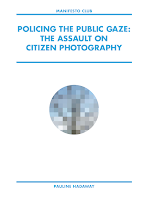
The last ten minutes of tonight’s Arts Extra programme (starts at 17.55) was devoted to the issues of citizen journalism and the pressures that photographers can come under while out documenting the world. Something AiB is not immune from!
Pauline Hadaway from Belfast Exposed talked about her recently launched report Policing the Public Gaze: The Assault on Citizen Photography, and Belfast flaneur and photographer Moochin Photoman (“recording the present for the future”) backing up the ideas with some personal examples.
There’s a discussion on the subject of the report in Belfast Exposed on Tuesday 29 September from 7-9pm. Get in touch with the organisers – Belfast Salon – if you want to go along.
The full report is available from Belfast Exposed website. The Executive Summary begins ...
From the late nineteenth century, countless ‘citizen photographers’ recorded almost every aspect of human experience, from intimate family occasions to uncensored images of war. They bestowed a vast photographic legacy, which provides us with a key insight into the past.
Throughout the twentieth century - through wars, cold wars, public disorder, IRA campaigns and countless national emergencies - British citizens enjoyed almost unhindered rights to take pictures of anything or anybody in public places.
Yet today, in peacetime, citizen photography is coming under growing assault. There is no overarching ban on photography, but there has been a creeping restriction of everyday photography - by community safety wardens, private security guards, and self-appointed ‘jobsworths’. The dynamic behind this is a suspicion of the citizen, and the identification of the citizen photographer with the paedophile or terrorist.
There are countless ‘no-go’ or touchy subjects for citizen photography. As a result, many children are growing up with gaps in the family photo album – no sports day or first swim photos - and as a society we have big gaps in our archives.
4 comments:
I'm looking forward to this.
The right to take pics of the police has been a bit of a sore point with me since PM Blair came a few years back. I took a pic of the motorcade parked outside the new Newsletter building. A policeman came over and actually deleted the image from my phone. Didn't know my rights then, but I do now.
Would love to have a sheet on me that informs the police of my rights as a member of the public.
Pretty sure I've heard of such a sheet (or possibly card) for the mainland. Not sure how much divergence there'd be in law for here...
I've read a lot about this - never been one for street photography but admit it puts me off even trying. The truth is the vast majority of "officer" of whichever hue who trouble photographers about this simply don't know the law.
I often worry our police officers aren't taught WHY they have more powers than the ordinary citizen - i.e. because as a society we consider it necessary, but also expect, and have the right to demand, the highest standards of scrutiny...
Truth is - no officer has the right to delete an image - but plenty think they do.
Bit slow to respond to this Alan.
Firstly i've never been called a 'flaneur' before though it sums up well what i do when i'm out and about moochin'
I was dissapointed that the programme finished early, turns out that it's had 6 mins taken of it. I had plenty more to say on the subject apart from my own experiences.
Whilst i wouldn't always agree with the direction that Belfast Exposed is heading i think the report is important. Even though it's largely about what's happening over in England the issues are non the less relevant here in NI.
We have a right to take photographs in a public place yet that right is slowly being eroded by heavy handed policing.
Telling someone to delete a photograph could be said to be a crime itself (though if you change your memory card and don't use it soft ware is available to retrieve the image).
The PSNI media policy states that unless the officer has a court order you do NOT have to delete an image.
There are many many more issues around this and there may well be a full programme devoted to the issues...i'll keep you posted.
Post a Comment